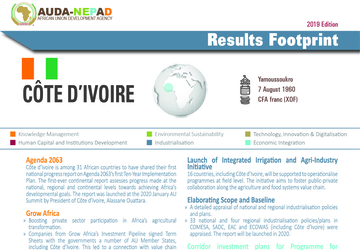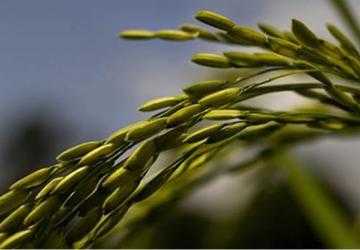 Côte d’Ivoire
Côte d’Ivoire
Official Name: Republic of Côte d’Ivoire
Capital: Yamoussoukro
Independence Day: 7 August 1960
Currency: CFA franc (XOF)
Key Result
4,080 women benefitted from two projects implemented in Côte d’Ivoire. The YEYA Agricultural Organisation supported rice production in the Bafing region and equipped and trained women in basic midwifery. It also supported 32 women’s groups engaged in traditional poultry farming and rice production. 32 community plots for rice cultivation were established, with a total of 20 hectares devoted to production.
85 Million hectares of degraded and deforested land on the continent have been committed for restoration through the application of the restoration opportunities assessment methodology by 2030. To-date, Côte D’Ivoire has committed 5 million ha.
Côte d’Ivoire signed the CAADP Compact on July 2010 committing to prioritise agricultural transformation and development. The country has integrated CAADP principles and values into its National Agricultural Investment Plan (NAIP). The country is at an advanced stage in the implementation of the NAIP and NEPAD supported Côte d’Ivoire to conduct an Independent Technical Review (ITR). A public expenditure study on the country’s agricultural sector was also conducted.
According to the CAADP Biennial Review Report, the progress made is evidenced by: 100% completion of CAADP processes, 14% increase of agricultural value added per agricultural worker, 14% increase of agricultural value added for arable land, 14% annual growth of the agricultural value added (agricultural GDP) and 64% for inclusive institutionalized mechanisms for mutual accountability and peer review.
Côte d’Ivoire also received support to increase productivity and strengthen institutions and systems for fish production, processing and trade through research and pilot interventions. The interventions have also addressed the impact of fish smoking on women’s health.
The country is among 25 African States that received support from NEPAD for climate change response. Small-holder farmers received training in Climate Smart Agriculture (CSA) practices and aquaculture. Policy makers were also sensitised on Climate Smart Agriculture (CSA) practices and aquaculture.
Côte d’Ivoire is expected to benefit from the Central African Interconnection Transmission Line Project which entails the construction of a 3,800 km transmission line system made up of four segments and spanning West, Central and Southern Africa.
The Abidjan-Lagos Coastal Corridor aims to modernise the most heavily travelled ARTIN corridor in West Africa (trade facilitation, One-Stop-Border-Posts, capacity enhancement and implementation of PPP)
The Praia-Dakar-Abidjan Multimodal Corridor aims to improve marine transport and the connection between island and mainland countries by creating a new maritime service between regional ports and facilitating this with a modern information system that links the maritime service with ports and road corridor in the Dakar-Abidjan Corridor.
Related
Projects
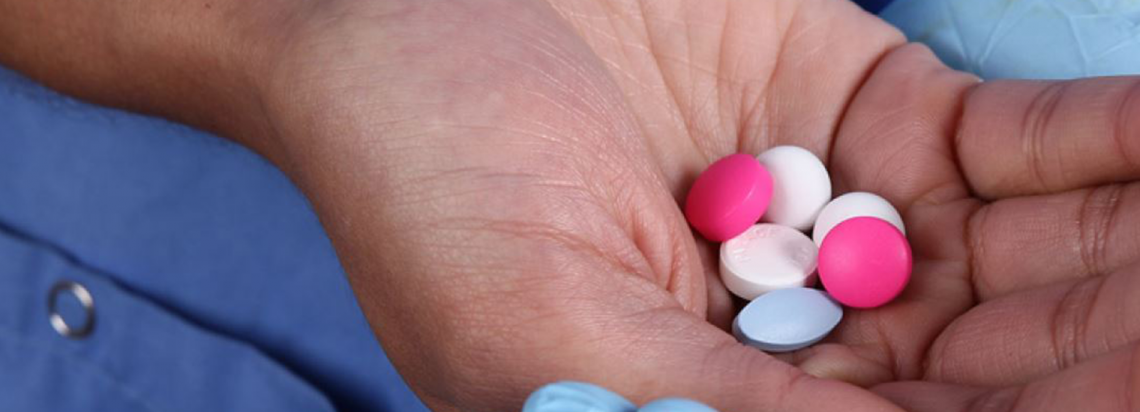
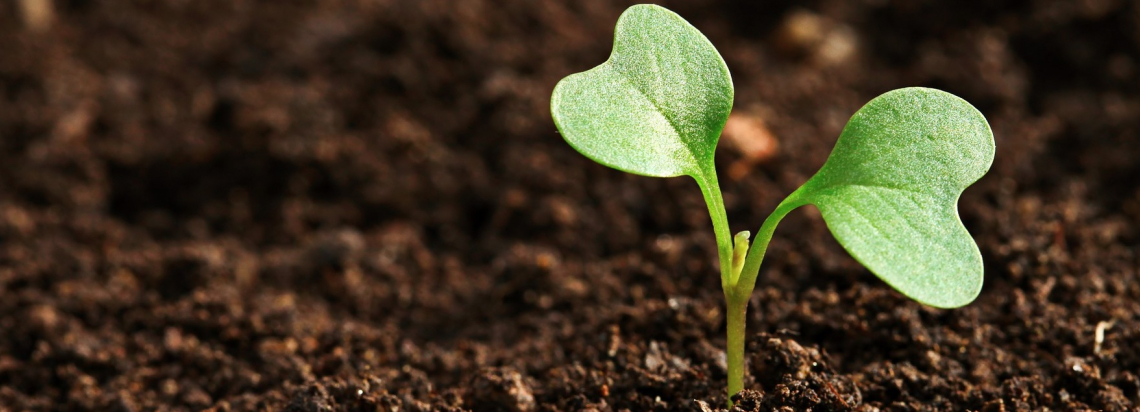
CAADP Compact: Côte d’Ivoire signed the CAADP Compact 26 - 27 July 2010.
National Agricultural Investment Plan: The country is in advanced stages of implementing its NAIP.
African Fisheries: A strategy was developed for post-harvest fish losses in Côte d’Ivoire as part of the riparian states along the Volta Basin, aligned with the Malabo Declaration and the Policy Framework and Reform Strategy for Fisheries and Aquaculture. The Malabo Declaration sets out agriculture transformation goals and targets set to be achieved by 2025.
Capacity Building: In June 2012, NEPAD supported Côte d’Ivoire in conducting an Independent Technical Review (ITR).
Business: From 12 - 14 September 2012, the NEPAD Agency facilitated Côte d’Ivoire’s first Business Meeting. A public expenditure study on the country’s agricultural sector was conducted as well.
Results:
• The NAIP is largely based on a public-private partnership and was designed to fit in with the key national priorities of development and poverty reduction. A detailed investment plan focuses on four strategic objectives: food security and self-sufficiency, sustainable management of cash crops and exports, private sector investment and agricultural reforms. It is implemented by the ministries of agriculture, livestock and fisheries, water and forests, and environment, and is overseen by various stakeholders.
• Implementation of the NAIP brought a new energy to the sector resulting in a growth in yields and revenue for farmers. Food production increased by 28 per cent while the production of cash crops increased by 14, 1 per cent. Revenue from products has also increased, notably for cocoa with a 25 per cent increase in gross income for 2013-2014.
• Another positive development was the establishment of management and control bodies and consultation frameworks for NAIP implementation, coupled with the transfer of implementation to the highest decision-making level.
• The Financing of a project to support the operationalization of the NAIP was another positive step.
• Approximately 1,062,648 jobs have since been created through rural development projects particularly in the provision of water pumps, school classrooms, canteens, clinics and the electrification of villages. Other improvements in terms of infrastructure are the building of rural roads and irrigation schemes, the development and reform of produce networks and an improved legal framework.

Project : TAH programme
Description : This is phase I of the continental connectivity programme that focuses on completion and standardisation of the TAH missing links by 2030
Project : Single African Sky phase 1 (design and initial implementation)
Description : Single African Sky is a continental programme that will create a high-level, satellite-based air navigation system for the African continent
Project : Yamoussoukro Decision implementation
Description : Accelerate Yamoussoukro Decision implementation by identifying countries that are ready to fully implement it, and discussing and agreeing with both their governments and airlines to launch the voluntary club on a full membership basis;
Project : West Africa Power Transmission Corridor
Description : 2,000 km line along the coast connecting with the existing Ghana– Nigeria line with a capacity of 1,000 MW
Project : Abidjan-Lagos Coastal Corridor (DFS)
Description : This programme would modernise the most heavily travelled ARTIN corridor in West Africa (trade facilitation, OSBPs, capacity enhancement and implementation of PPP)
Project : Praia-Dakar-Abidjan Multimodal Corridor
Description : This programme would improve marine transport and the connection between island and mainland countries by creating a new maritime service between regional ports and facilitating this with a modern information system that links the maritime service with ports and road corridor in the Dakar-Abidjan Corridor.
Project : Abidjan-Ouagadougou/Bamako (DFS)
Description : This programme would modernise and rehabilitate the multimodal corridor that suffered during civil war in Côte d’Ivoire
Project : West Africa Hub Port and Rail Programme
Description : This programme aims at responding to the future capacity problems in West African ports. This programme has two components : (a) a regional hub port and rail linkage master plan and (b) port expansion
Project : ICT Enabling Environment
Description : This programme would improve the environment for the private sectors to invest in high-speed broadband infrastructure
Project : ICT Terrestrial for Connectivity
Description : This programme has two main components : secure each country connection by at least two broadband infrastructure and ensure the access to submarine cable to all landlocked countries
Project : Internet Exchange Point (IXP) programme
Description : The aim of this programme is to provide Africa with adequate internet node exchange to maximise internal traffic

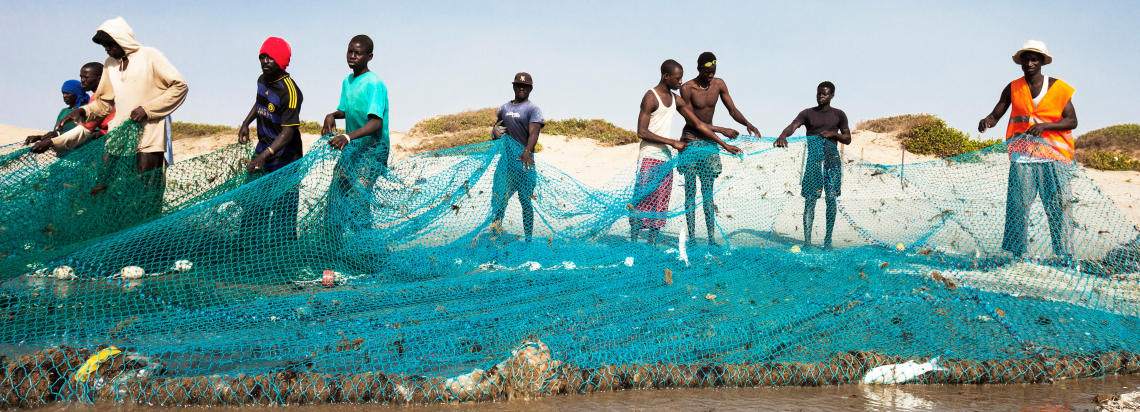
Cote d’Ivoire was one of the six West African states represented in the Fisheries Committee for the Centre-West Gulf of Guinea (FCWC), which was a result of Fisheries and Aquaculture Programme investing in the strengthening of platforms for sub-regional ministers of fisheries. The development of this functional working relationship will facilitate institutional support activities and create a platform for knowledge sharing amongst member states, consequently resulting in the sustainability and prosperity of the fisheries sector in Cote d’Ivoire and the West Africa region.
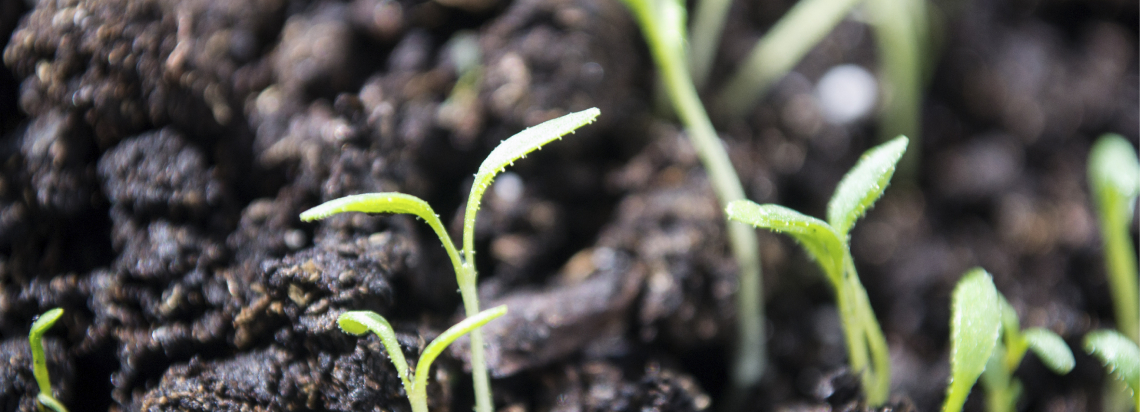

Advocacy and Strengthening of Negotiation Capacities on Post-2015 Development Agenda through the Common African Position (CAP)
Global Partnership for Effective Development Cooperation (GPEDC)
The Global Partnership is an inclusive political forum bringing together governments, bilateral and multilateral organisations, civil society and representatives from parliaments and the private sector, committed to strengthening the effectiveness of development co-operation to produce maximum impact for development. Through its multi-stakeholder platform, the Global Partnership provides support, guidance and shares knowledge to boost development impact with a strong country focus, and to ensure a degree of coherence and collaboration among all development stakeholders on co-operation flows and policies. It offers a global mechanism to ensure co-operation is based on Busan principles of ownership, results, inclusiveness; and transparency and accountability to deliver tangible results on the new SDGs. NEPAD Agency is the Africa’s Secretariat for the Global Partnership.
Results (2013 – 2015)
Advocacy and Strengthening of Negotiation Capacities on Post-2015 Development Agenda through the Common African Position (CAP):
• The multi-stakeholder framework of engagement specifically enhanced dialogue towards ensuring the required mass to influence the Post-2015 Global Agenda and Development Goals relevant to the Continent;
• This intervention helped strengthen country and regional level negotiating capacities for the effective incorporation and articulation of Africa’s priorities as enshrined in CAP in the final Global SDGs;
• The project enabled the participation of African stakeholders at the Means of Implementation Engagement, 3rd Financing for Development Conference and the UN General Assembly that adopted the new SDGs. This ensured the incorporation of Africa’s development priorities into the new goals through developing essential negotiation capacities;
• Through the CAP/SDGs space on the Africa Platform for Development Effectiveness (APDev), knowledge products and negotiation documents, as well as, policy briefs where successfully disseminated to the African negotiators in New York and kept the continent’s stakeholders informed of the overall process;
• Development and dissemination of post-2015 Policy Briefs on “Financing and Partnerships” and “Structural Economic Transformation and Inclusive Growth”. These are priorities outlined in the CAP and the policy briefs where utilized in the negotiation process for the African continent.
Global Partnership for Effective Development Cooperation (GPEDC):
• Africa secured the hosting of the 2nd High Level Meeting (HLM) of the Global Partnership. This was attained through robust negotiation and facilitating a common voice from Africa with regards to this critical engagement by the NEPAD Agency. The 2nd HLM will be held in Nairobi Kenya;
• The NEPAD Agency advocated for the full inclusion and participation of Africa’s Regional Economic Communities (RECs) in conducting the 2nd GP Monitoring Exercise. This was a fundamental achievement considering the RECs are the continent’s building blocks with regards to socio-economic transformation;
• The Africa Action Plan on Development Effectiveness (AAP) was granted the status of an official Global Partnership Initiative (GPI) at the Planning Meeting in Brussels. The AAP was developed by the NEPAD Agency in consultation with African multi stakeholders. This has enabled the Agency to successfully mobilize resources towards the implementation of the AAP.
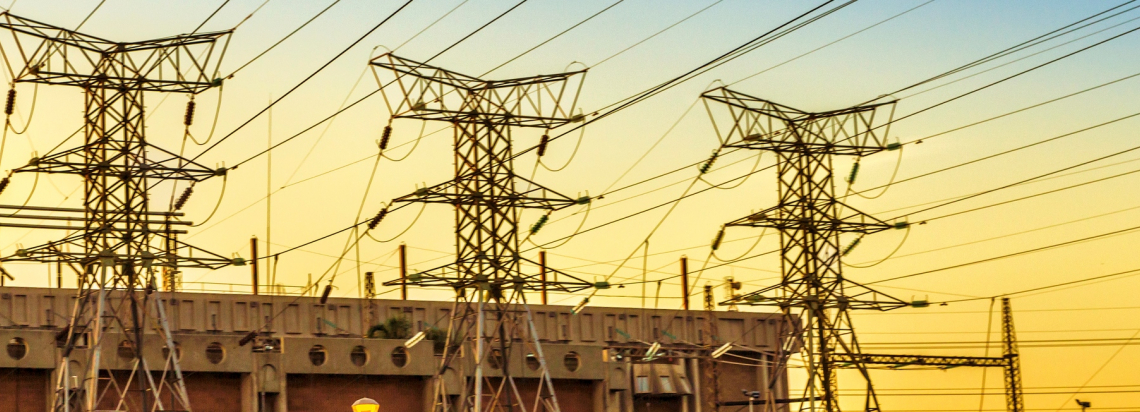
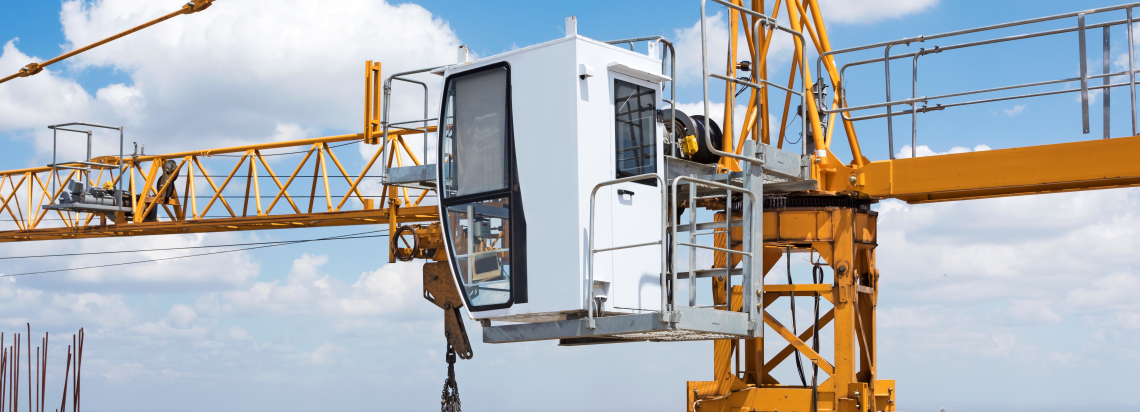
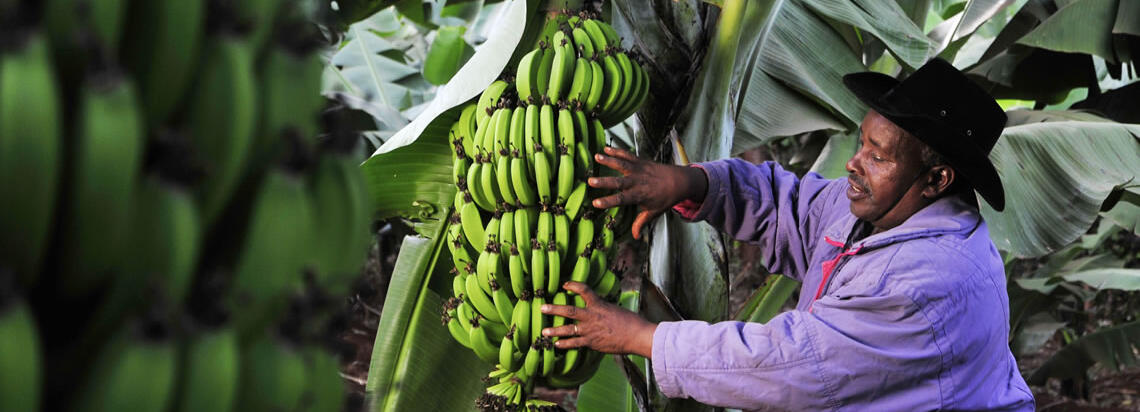
- Grow Africa is prioritising the rice value chain in Côte d’Ivoire to build on its existing engagement in this priority local value chain, and in alignment with the overall West Africa strategy. In July 2017, Grow Africa and the Office National pour le Développement du Riz en Côte d’Ivoire (ONDR), now known as theAgency for Rice Development (ADERIZ),launched the country’s first inclusive national rice value chain platform named, Rice CIV.
- Grow Africa is also working to establish a strong multi-stakeholder platform in Côte d’Ivoire to represent the agriculture sector and enable better collaboration.
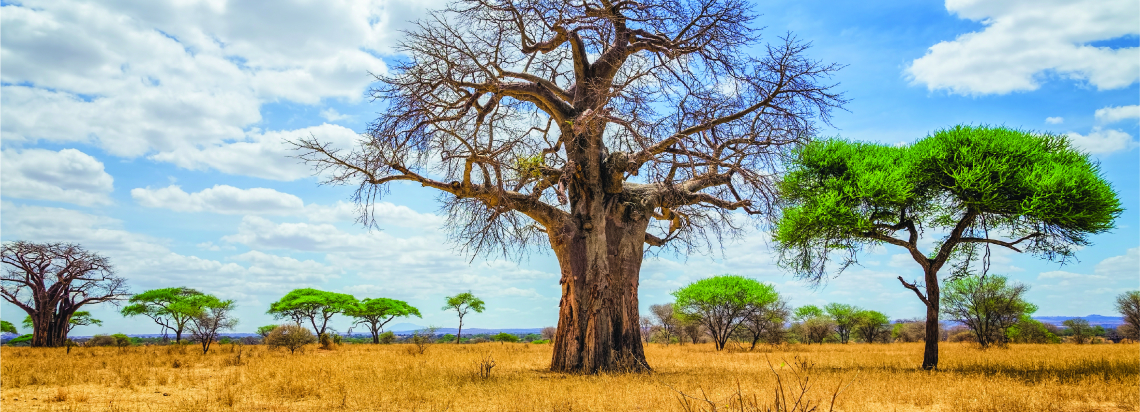
Plans are underway to support the launching of the national SLM platform that will to foster linkages between different departments and ministries and bring together various stakheolders and pave way for the development of the counry investment framework for SLM.
you agree to the AUDA-NEPAD Privacy Policy.



